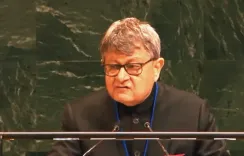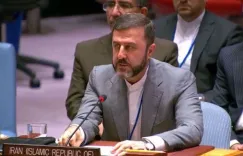Should Nations Accelerate Emission Reductions to Safeguard the Climate?

Synopsis
Key Takeaways
- The ICJ ruling establishes legal obligations for nations regarding climate change.
- Greenhouse gas emissions are confirmed to be caused by human activity.
- This ruling could accelerate global climate litigation.
- Developed nations must be accountable for climate damages.
- Urgent action is required to mitigate climate change impacts.
New Delhi, July 23 (NationPress) In a transformative climate ruling, the International Court of Justice (ICJ), the principal judicial entity of the United Nations, on Wednesday issued a pivotal unanimous advisory opinion regarding the legal responsibilities of nations to combat climate change in accordance with international law.
Presenting the opinion in The Hague, the court’s President, Iwasawa Yuji, stated that greenhouse gas emissions are “indisputably” a result of human activity and highlighted the “urgent and existential threat” that climate change represents.
“The impacts of climate change are profound and widespread. They influence both natural ecosystems and human societies. These effects emphasize the urgent and existential threat climate change poses,” remarked Iwasawa.
The case was initiated by Vanuatu and several other Pacific Island nations, following a youth-driven campaign in 2019 advocating for its presentation to the ICJ.
Before the court’s 15 judges were posed two crucial questions regarding the obligations of states concerning climate change: What are the obligations of states under international law to tackle climate change for both current and future generations? And what are the legal ramifications for states that neglect these obligations?
The ICJ, as the leading judicial body of the UN, released its opinion amidst growing global pressure on fossil fuel producers, with courts around the world increasingly referencing the undeniable scientific evidence indicating that a swift phaseout of fossil fuels is essential to achieve climate objectives and safeguard human rights.
Reacting to the ICJ’s ruling, Mohamed Adow, Director of the Nairobi-based think tank Power Shift Africa, stated to IANS: “This ruling serves as a major impetus for climate justice. The ICJ has validated what Africa has long argued—that wealthy nations must be held accountable for the harm their emissions have inflicted.
“For a continent like Africa—least responsible yet most impacted—this decision is a crucial lifeline. It amplifies our demand for reparations, debt relief, and genuine climate financing—not loans that exacerbate poverty.
“The era of polluters evading responsibility behind ambiguous promises has ended. Africa will no longer serve as a scapegoat for others' excesses. The law now supports our moral argument. It’s time for affluent nations to fulfill their climate obligations and back a just transition fueled by Africa’s renewable energy potential.”
Describing the ICJ’s groundbreaking advisory opinion as a pivotal moment in the struggle for climate justice, Harjeet Singh, a climate activist based in New Delhi and founding director of the Satat Sampada Climate Foundation, told IANS: “This is a significant declaration indicating that the era of impunity for polluters and complicit states is concluded. This landmark decision unequivocally imposes stringent obligations on states to compel fossil fuel producers to take immediate and drastic action, holding them fully accountable for the damage they have caused. This necessitates a fundamental shift where states must rigorously regulate, limit, and ultimately dismantle the fossil fuel industry’s capacity to cause further harm.”
He noted that the court's findings pave the way for complete reparations, meaning polluters must not only cease their harmful actions but also provide financial compensation for losses and damages incurred. This includes compensation for climate harm and, critically, an immediate halt to greenhouse gas emissions exceeding scientifically established safety thresholds.
The ICJ was established by the United Nations Charter in June 1945 and commenced its operations in April 1946. The court consists of 15 judges elected for a nine-year term by the UN General Assembly and Security Council, with its seat located at the Peace Palace in The Hague, Netherlands.
ICJ President Yuji stated: “This is a matter of planetary significance that threatens all forms of life...The court presents this opinion with the hope that it will enable the law to inform and direct social and political actions to address the ongoing climate crisis.”
He emphasized: “Failure by the state to take appropriate measures to protect the climate system from GHG emissions, including through fossil fuel production, consumption, granting exploration licenses, or providing subsidies, may constitute an internationally wrongful act attributable to that state.”
Climate experts assert that the ICJ’s decision serves as a powerful new legal instrument that will trigger a global acceleration of climate litigation.
Courts around the world are likely to cite this ruling in future decisions. It will also bolster legal arguments in ongoing and forthcoming climate lawsuits, particularly those aimed at corporate defendants like fossil fuel companies.
The ruling clarifies that international law necessitates more than just voluntary action, imposing obligations on historical polluters to reduce emissions and compensate climate-impacted communities.
Furthermore, it reaffirms the primacy of climate science, providing an opportunity to rejuvenate global climate discussions with legal clarity regarding rights and responsibilities.
The innovative campaign for an advisory opinion was initiated in 2019 by law students from the University of the South Pacific. Collaborating with the Vanuatu government, Pacific Island Students Fighting Climate Change (PISFCC), and World’s Youth for Climate Justice (WYCJ), they secured a unanimous vote at the United Nations to request the opinion, backed by over 1,500 organizations.









